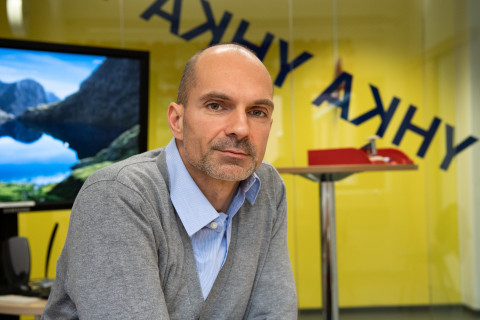Sometimes it’s wise to set less ambitious goals for large-scale programmes seeking to integrate social welfare and health care services – and there’s nothing wrong with that, Associate Professor Axel Kaehne says.
Last year, the Department of Health and Social Management at the University of Eastern Finland celebrated its 40th anniversary. Axel Kaehne from Edge Hill University in the UK was one of the visiting professors hosted by the department during the jubilee year. He leads the Special Interest Group for Integrated Care of the European Health Management Association, EHMA.
“There is international evidence that large-scale integration programmes fail to meet the expectations set for them. Rather, they tend to disrupt existing services and make things more difficult for staff and patients alike,” Kaehne points out.
According to him, however, it is understandable that politicians and social and health care managers want to implement large-scale and structural integration programmes, given that the past 20 years have witnessed health care systems becoming increasingly complex and more challenging to manage.
“Due to rapid changes in society, there is a need for rapid ways of steering that change. Large structural reforms are sometimes a kind of a last resort for politicians.”
Effects on patients should be studied more
Kaehne’s research focuses, among other things, on integrated care, and he has designed and delivered evaluations of health improvement programmes in England and Wales. According to him, the University of Eastern Finland carries out outstanding research relating to the integration of care for the elderly, as well as in the management of social welfare and health care services.
“My visit here has been a unique opportunity for identifying future opportunities for collaboration,” Kaehne says.
He points out that currently, research addressing the outcomes of integrated care is not detailed and sensitive enough. Research tends to focus on benefits that integrated care can deliver to health care organisations or public health at large, while less attention is paid to the viewpoint of patients.
“This is not an easy task. We need to develop new indicators and also convince our fellow researchers that outcome research should take the patient perspective into consideration as well. On this front, Senior Researcher Anneli Hujala here at the University of Eastern Finland has done a fantastic job.”
The patient perspective should be at the centre of integration programmes – instead of political pressures.
“It’s not wise to spend money on integration programmes that ultimately won’t translate into better care for patients.”
Kaehne emphasises the second phase of integration, where the focus is on patient care and how to improve it. Research, too, should shift in the direction of the patient.
“It’s hard to predict when the shift is coming, but we are headed in the right direction.”
Closer cooperation
Kaehne sees many opportunities for collaboration with researchers at the Department of Health and Social Management. In the 2019 EHMA conference, he delivered a joint session with UEF researchers. 2020, on the other hand, will witness a special issue on integrated care in the Journal of Integrated Care, of which Kaehne is the Editor-in-Chief. UEF researchers will have guest editorial responsibility relating to the special issue.
“It is also possible that we’ll organise an event around integrated care in Helsinki.”
Celebrating its 40th anniversary in 2019, the Department of Health and Social Management hosts several visiting scholars every year. The department has a strong and internationally recognised profile especially in health management research. The jubilee year culminated in October in a seminar addressing the future role of social welfare and health care management.
